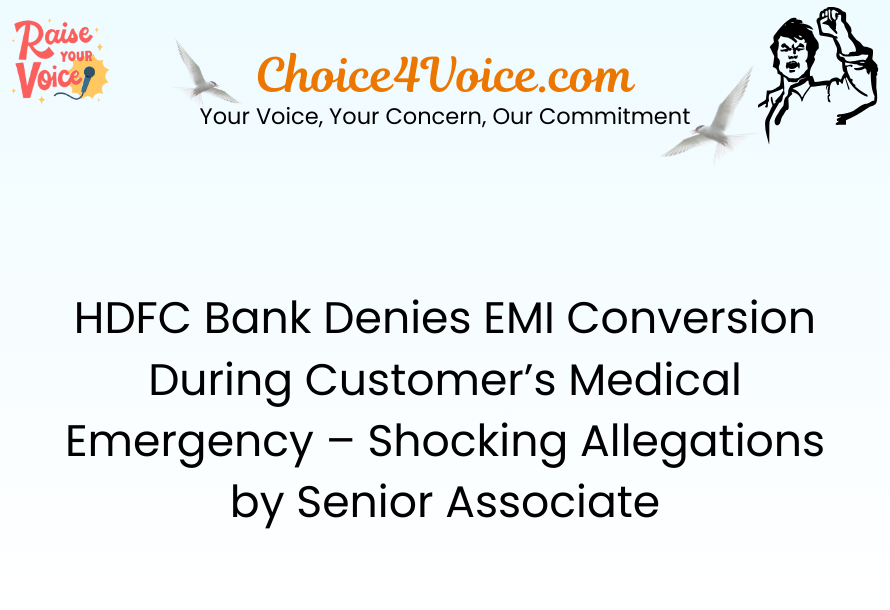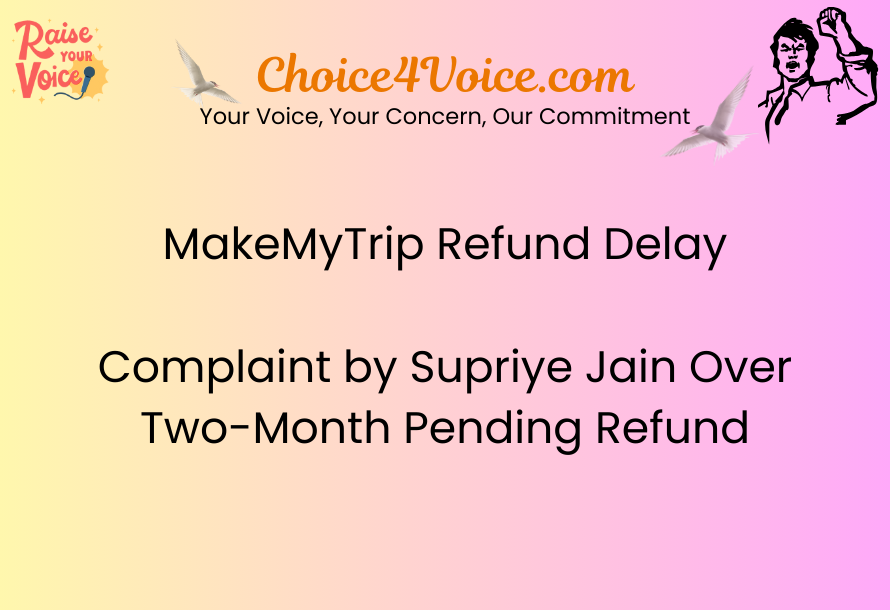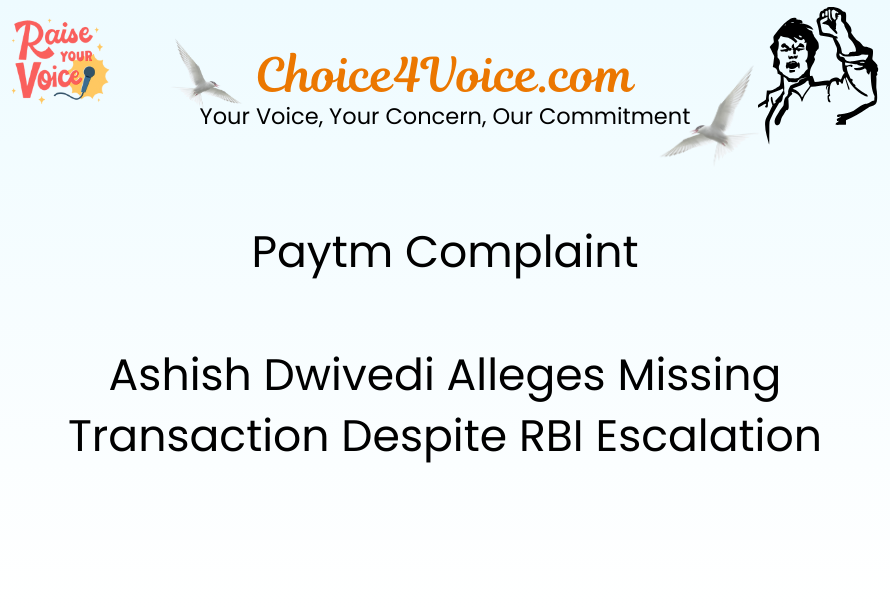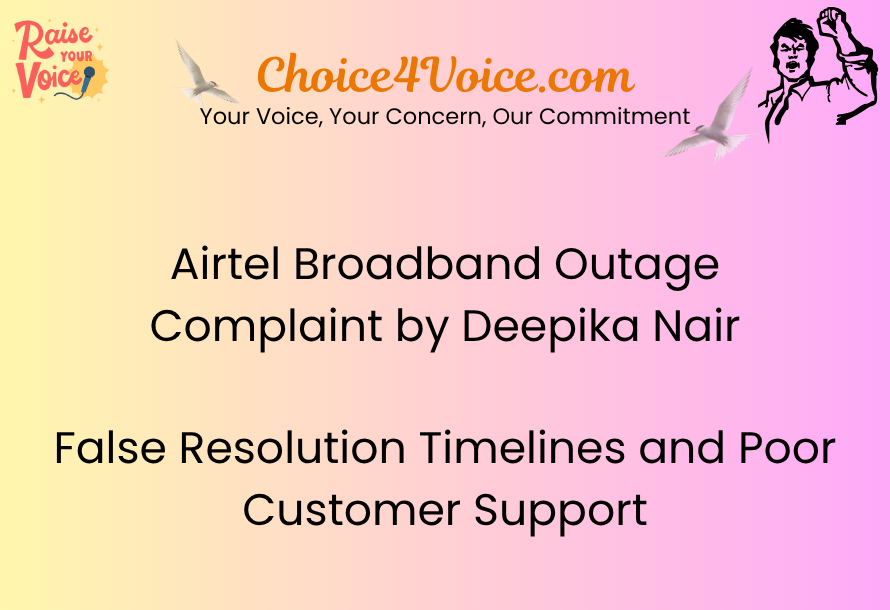If you’re experiencing this problem with this brand or any other company, submit your complaint and we may feature it on Choice4Voice.com.
Submit your complaint →Senior Associate Saagar Vinayak alleges that HDFC Bank denied converting his credit card dues into EMIs during his newborn’s surgery, citing rigid policy. Full details, timeline, and consumer rights explained.
Complaint Summary : HDFC Bank Refuses EMI Conversion for Senior Associate Saagar Vinayak During Medical Crisis
| Field | Details |
|---|---|
| Complainant Name | Saagar Vinayak |
| Designation & Employer | Senior Associate at BNY Mellon, Ex-PayPal |
| Company Complained Against | HDFC Bank |
| Nature of Complaint | Denial of credit card EMI conversion despite urgent medical emergency |
| Incident Date | August 2025 (exact date not provided) |
| Location | India |
| Complaint Platform | |
| Customer’s Demand | Convert outstanding credit card dues into EMIs during medical emergency |
| Company Response | EMI conversion denied citing “offer eligibility” |
| Current Status | Unresolved |
| Source | Original LinkedIn Post |
Detailed Complaint Report
Saagar Vinayak, a Senior Associate at BNY Mellon with previous experience at PayPal, has publicly accused HDFC Bank of showing a complete lack of empathy during one of the most critical moments in his life.
According to his LinkedIn post, his newborn child required urgent surgery, resulting in high medical expenses. To manage the sudden financial burden, Saagar approached HDFC Bank to convert his outstanding credit card dues into an EMI plan.
However, the bank’s customer care team reportedly denied his request, stating:
“Your card must have an offer for EMI conversion; otherwise, nothing can be done.”
The complainant alleges that no flexibility or discretion was shown despite the genuine medical emergency. He described the interaction as robotic policy enforcement, lacking any human consideration or customer-first approach.
Frustrated and disappointed, Saagar announced his decision to close all his accounts and relationships with HDFC Bank, questioning whether the bank’s slogans about “understanding customer needs” truly match their actions.
Key Issues Raised
- Lack of empathy during a medical crisis
- Rigid adherence to pre-set EMI eligibility rules without considering exceptional circumstances
- Failure to provide alternative solutions or escalate the matter to higher authorities
- Potential reputational risk for HDFC Bank due to negative publicity on a public platform
Expert Analysis
This case highlights a major gap in banking policies, particularly in handling emergency situations. While financial institutions have to follow guidelines for credit risk, most leading banks have emergency support provisions that allow exceptions for genuine hardship cases.
HDFC Bank’s alleged refusal, if accurate, suggests inflexible internal systems and a lack of customer centric escalation mechanisms. Such incidents can severely damage customer trust, especially when they involve life and death medical situations.
Consumer Rights Perspective
Under RBI’s Fair Practices Code for Lenders, banks are expected to treat customers fairly and consider individual circumstances before making credit-related decisions. While EMI conversions are discretionary, RBI guidelines encourage flexibility in genuine hardship cases.
Consumers facing such issues can:
- Escalate the complaint to the bank’s nodal officer.
- File a grievance with the Banking Ombudsman if no resolution is provided within 30 days.
- Keep all documentary evidence, such as call recordings, written responses, and transaction statements.
Q&A – Understanding the Issue and Your Rights
Q1: What is credit card EMI conversion?
A: EMI conversion allows you to repay your credit card dues in smaller monthly installments instead of paying the full amount in one go. This can ease financial stress during emergencies. However, banks usually require the transaction to meet certain eligibility criteria (such as minimum transaction amount or merchant category).
Q2: Can a bank refuse EMI conversion in a medical emergency?
A: Yes, banks can refuse EMI conversion if your transaction or card does not meet their internal criteria. However, many banks have the discretion to make exceptions in cases of genuine hardship, especially when supported by medical documentation.
Q3: What should you do if a bank refuses EMI conversion?
A: You should immediately escalate the matter:
- Request to speak with a senior manager or nodal officer.
- Submit a written request with supporting documents (e.g., medical bills, hospital letters).
- Contact the Banking Ombudsman if the bank remains unresponsive.
Q4: What is RBI’s stance on such matters?
A: RBI’s guidelines encourage fair treatment and require banks to have a grievance redressal mechanism. While RBI does not mandate EMI conversions, it emphasizes customer-centric solutions in genuine hardship cases.
Q5: Are there alternative ways to manage medical expenses if EMI conversion is denied?
A: Yes, possible options include:
- Personal loans from your bank or other lenders.
- Medical loans offered by specialized fintech companies.
- Overdraft facility if linked to your savings account.
- Using a credit card balance transfer facility from another bank.
Q6: Can this incident affect HDFC Bank’s reputation?
A: Yes. Public complaints about lack of empathy, especially during medical emergencies, can significantly harm brand trust and customer loyalty.
Q7: How long does EMI conversion usually take if approved?
A: Typically, EMI conversions are processed within 3–7 working days. For urgent cases, banks can expedite processing, but this depends on internal approval channels.
Q8: What documentation should customers keep in such situations?
A: Always maintain:
- Written communication with the bank
- Screenshots of offers/promises made
- Medical documentation proving urgency
- Proof of request submission and reference numbers
Q9: Can social media posts help in such disputes?
A: Yes. Many banks monitor social media and respond faster to public complaints due to reputational concerns.
Q10: What is the lesson for customers from this case?
A: Always check if your card offers EMI conversion before relying on it, and have a backup financial plan for emergencies. If the bank refuses, escalate quickly and consider alternative funding sources.



